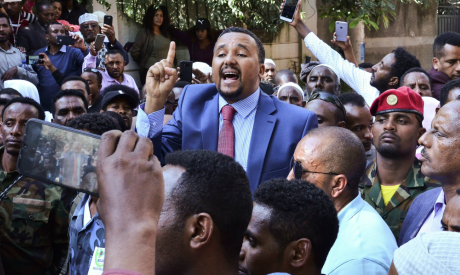
Jawar Mohammed (C), a member of the Oromo ethnic group who has been a public critic of Abiy, addresses supporters that had gathered outside his home in the Ethiopian capital, Addis Ababa October 24, 2019. (Photo: AFP)
Prominent activist Jawar Mohamed does not rule out challenging his erstwhile ally, Ethiopian Prime Minister Abiy Ahmed, in next year's election, he told Reuters on Friday, after days of demonstrations by his supporters resulted in dozens of deaths.
Mohamed's ability to organise street protests helped propel Ahmed to power last year, ushering in sweeping political and economic reforms. Ahmed won the Nobel Peace Prize this month for his regional peacemaking achievements.
But this week, Mohamed's supporters demonstrated against Ahmed after the former said police had surrounded his home and tried to withdraw his government security detail.
Ahmed is media mogul, and like Ahmed, he hails from the majority Oromo ethnic group. His supporters have stopped believing in Ahmed's promises of reform, he said, accusing Ahmed of centralising power, silencing dissent, and jailing political prisoners -- like his predecessors.
Observers think that Mohamed and other kingmakers are flexing their muscles, said Reuters.
Deadly ethnic tensions pose a major challenge to reformist Prime Minister Ahmed as next year's election approaches, AP said.
Ethiopia will face problems if it delays its general election beyond the scheduled date of May next year, the prime minister said.
According to Reuters, the electoral board has the financing and capacity to conduct the polls in the country of 105 million.
The vote would be the first under Ahmed, who took office in April 2018.
The political and economic reforms Ahmed introduced have opened up what was once one of Africa’s most repressive nations, but they have also stoked violence as emboldened regional strongmen build ethnic power bases and compete over political influence and resources.
Ethiopia has regularly held elections since 1995, but with the exception of the 2005 election, no election has been competitive. In the 2005 poll, riots erupted after the opposition cried foul, security forces killed nearly 200 protesters, and the government jailed many opposition politicians.
Sixty-seven people were killed in two days of protests this week in Ethiopia's Oromia region, the region's police commissioner told Reuters late on Friday.
Sixty-two of those killed were protesters and five were police officers, Oromia regional police commissioner Kefyalew Tefera said. Thirteen died from bullet wounds and the rest from injuries caused by stones, he added.
Ethnic and religious violence has been reported in several towns and cities, said AFP.
Ethiopia's army says it is deploying troops to calm deadly unrest that has raged in the past three days, mainly in the Oromia region.
Army Spokesman Major General Mohamed Tessema says soldiers are being deployed across Oromia and in Harar and Dire Dawa.
On Thursday, the Orthodox Church issued a call for calm, saying the violence has "resulted in the loss of lives and caused damages to properties and mass displacements," according to the state-affiliated Fana Broadcasting Corporate.
Short link: